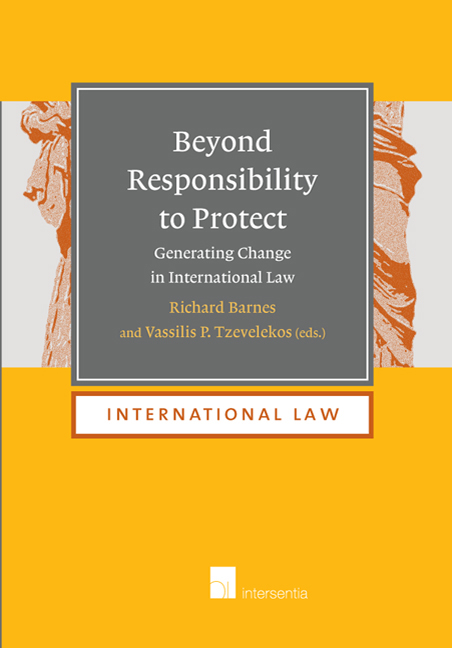Book contents
- Frontmatter
- Dedication
- Foreword
- Acknowledgements
- Contents
- Table of Cases
- List of Authors
- Introduction
- Part I The Moral Underpinnings and Political Ends of R2p
- The Kantian Defence of Murder
- A ‘Responsibility to Democratise’? The ‘Responsibility to Protect’ in Light of Regime Change and the ‘Pro-Democratic’ Intervention Discourse
- Commentary: Between Kant and Al-Shabaab
- Part II International Institutions And Their Role In R2p
- PART III De Facto Regimes and Non-State Actors Within a State And as a State
- Part IV R2p and Due Dilligence Regarding the Conduct of Corporations
- Part V The Interaction Between R2p And Humanitarian Law Obligations To Protect Civilian Populations
- PART VI R2p and International Criminal Law Beyond the Four R2p Crimes
- Part VII R2p and its Possible Impact on the Law of International Responsibility
- Part VIII Concluding Observations
- Index
Commentary: Between Kant and Al-Shabaab
from Part I - The Moral Underpinnings and Political Ends of R2p
Published online by Cambridge University Press: 19 September 2018
- Frontmatter
- Dedication
- Foreword
- Acknowledgements
- Contents
- Table of Cases
- List of Authors
- Introduction
- Part I The Moral Underpinnings and Political Ends of R2p
- The Kantian Defence of Murder
- A ‘Responsibility to Democratise’? The ‘Responsibility to Protect’ in Light of Regime Change and the ‘Pro-Democratic’ Intervention Discourse
- Commentary: Between Kant and Al-Shabaab
- Part II International Institutions And Their Role In R2p
- PART III De Facto Regimes and Non-State Actors Within a State And as a State
- Part IV R2p and Due Dilligence Regarding the Conduct of Corporations
- Part V The Interaction Between R2p And Humanitarian Law Obligations To Protect Civilian Populations
- PART VI R2p and International Criminal Law Beyond the Four R2p Crimes
- Part VII R2p and its Possible Impact on the Law of International Responsibility
- Part VIII Concluding Observations
- Index
Summary
I have been invited to comment on the two preceding chapters not as an international lawyer but as someone with an interest in both legal philosophy and state violence. Both chapters discuss a supposed ‘responsibility to democratise’ and its possible basis in, inter alia, Kant's philosophy. I make no claim to being a Kant scholar, but the most natural reading of Perpetual Peace and the relevant sections of The Metaphysics of Morals seems to me to be that all states ought to be republican (with separation of powers, and in some sense representative of the people, though not necessarily with an elected government), but that no state has the right to impose a republican constitution on another, except in very limited circumstances. I am not confident that this was Kant's view, but if it was then (substituting ‘democratic’ for ‘republican’) I think he was right on both points. As I understand them (and I do not find their argument easy to pin down), Beham and Janik think that acceptance of the first point – the moral illegitimacy of undemocratic regimes – will support the extension of R2P to permit forcible democratisation in some circumstances. Jones I understand to be rejecting both forcible democratisation and universalist arguments for democracy.
Before turning to such matters as the interpretation of Kant, and in the spirit of Jones's plea to understand those we may be tempted to brand as enemies of humanity, let me begin by introducing another voice into the conversation. It is that of the late Sheikh Abubakar Shariff Ahmad, known as Makaburi, a prominent Muslim preacher in Mombasa, Kenya, whom I interviewed in January 2013, three months before he was murdered, almost certainly by a paramilitary unit of the Kenyan police. Whether or not Makaburi was, as the police alleged, a leading recruiter of young Kenyans for the Somali armed group al-Shabaab, he strongly defended the right of the al-Shabaab to establish an Islamic state in Somalia and impose a strict interpretation of Sharia law:
‘The Somalis have every right to govern themselves; I am a hundred percent for the Somalis to govern themselves under sharia law. I am a hundred percent for the Afghanis to govern themselves under sharia law, if that is their choice. I am a hundred percent for the Iraqis to govern themselves under sharia law.
- Type
- Chapter
- Information
- Beyond Responsibility to ProtectGenerating Change in International Law, pp. 71 - 78Publisher: IntersentiaPrint publication year: 2016



